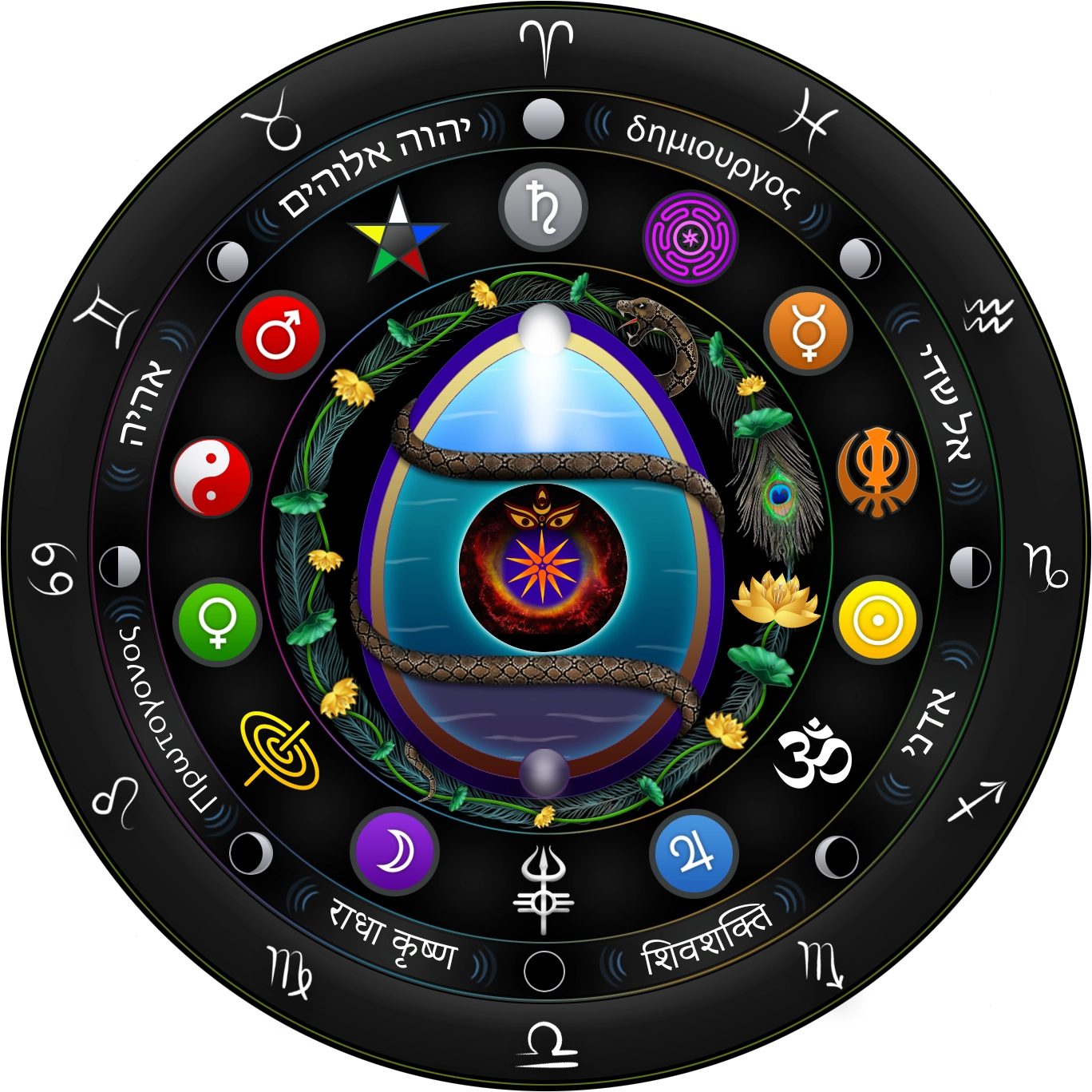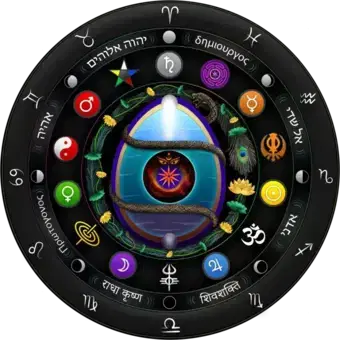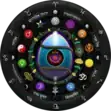SCHOOL OF OUR DIVINE
INFINITE BEING
Polytheistic Monism - Divine Theurgy - Oracle to the Gods
Jungian Typology and the Court Cards of the Tarot: Introduction
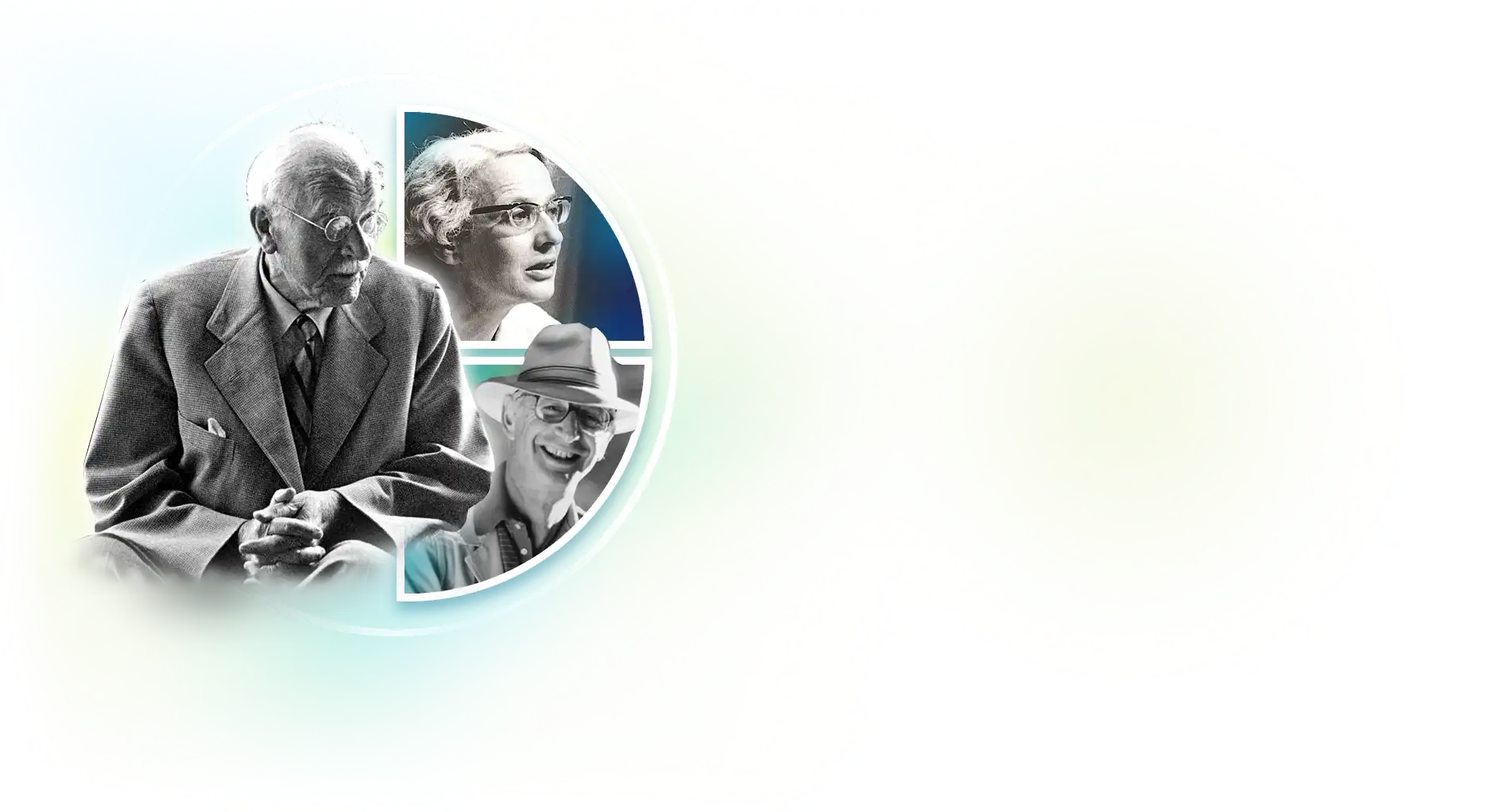
The School of Our Divine Infinite Being fully embraces the genius and depth of Carl Jung and his various developments in psychology. One of his most famous developments is the idea of “Introverted” and “Extroverted”, something everyone has now heard of and uses. These terms come from Jung’s work in a more widely studied field called Typology. Typology and its development was an in-depth project for Jung and he worked on it his entire career. His book “Psychological Types”, the work where most of this stems from, was the largest volume of his entire corpus. Many famous psychologists have continued that work including James Hillman and Marie Von Franz.
The project was picked up and perfected by the Myers-Briggs’ team and changed into the now infamous MBTI personality test. This test allows individuals to answer a series of questions and thereby result in answers concerning their psychological disposition, tendencies, and values. From the 12 original psychological types Meyers-Brings ended with 16 they termed personality types. The 16 personalities have continued their development through various authors, podcasters, and the Myers-Briggs foundation themselves. Millions of people take the Meyers-Briggs test per year and millions more find it to be of value in their lives. The Meyers-Briggs method has become widely known as MBTI, which is how we will reference it throughout the rest of this essay.
Several authors over time compared MBTI to the Court Card alchemy of the Tarot. The symbolic concepts were so closely related that it has become widely known that this connection has significance. Many occult scholars worked on this idea and now there is literature and articles well established that explain the correlations. Our mystery school has continued this process and fully integrated Jungian Typology in our Young Adult programs and the court cards of the Divine Tarot.
Jungian Typology and the Court Cards of the Tarot
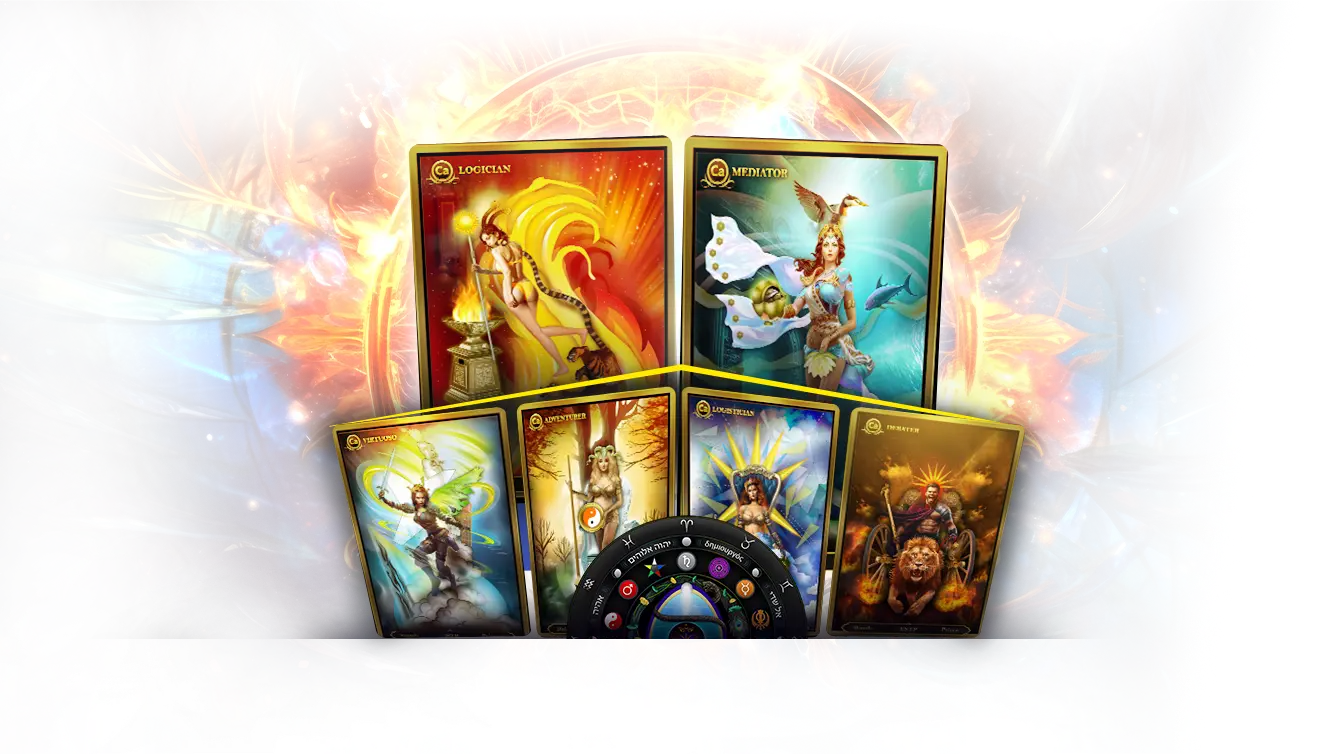
Introverts are more comfortable living alone and being by themselves. They depend on their “me time” to recharge; they become immersed in their inner world and run the risk of losing touch with their surroundings or their outer world.
Extroverts, on the contrary, are actively involved in the world of people and things; they are socially active and more aware of what is going on around them.
“Perception involves all the ways of becoming aware of things, people, happenings, or ideas. Judgment involves all the ways of coming to conclusions about what has been perceived. If people differ systematically in what they perceive and in how they reach conclusions, then it is only reasonable for them to differ correspondingly in their interests, reactions, values, motivations, and skills”.Carl Jung
“The purpose of the Myers-Briggs Type Indicator® (MBTI®) personality inventory is to make the theory of psychological types described by C. G. Jung, understandable and useful in people's lives. The essence of the theory is that much seemingly random variation in the behavior is actually quite orderly and consistent, being due to basic differences in the ways individuals prefer to use their perception and judgment”.The Meyer Briggs Foundation
MBTI Version
Extraversion (E)
Introversion (I)
iNtuition (N)
Sensation (S)
Thinking (T)
Feeling (F)
Judging (J)
Perception (P)
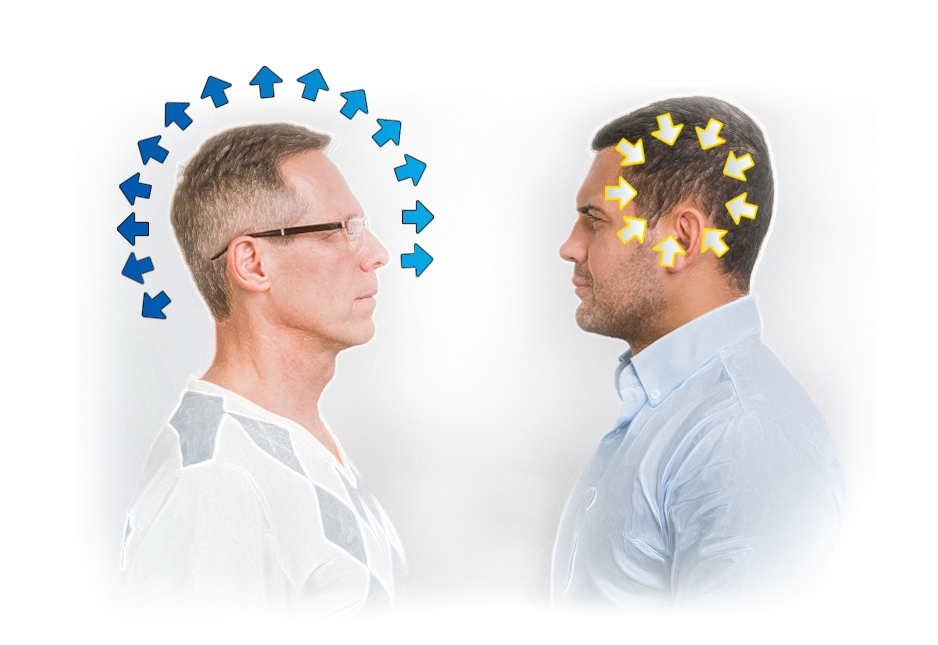
Functions:
Extraversion:
A strong, if not exclusive, determination by the object. If man thinks, feels, acts, and actually lives in a way that is directly correlated with the objective conditions and their demands, he is extraverted. Objective NOT subjective.
Introversion:
A turning inwards of the libido, whereby a negative relation of subject to object is expressed. Interest does not move towards the object, but recedes towards the subject. Everyone whose attitude is introverted thinks, feels, and acts in a way that clearly demonstrates that the subject is the chief factor of motivation while the object at most receives only a secondary value.
Thinking:
Thinking is that psychological function which, in accordance with its own laws, brings given presentations into conceptual connection.
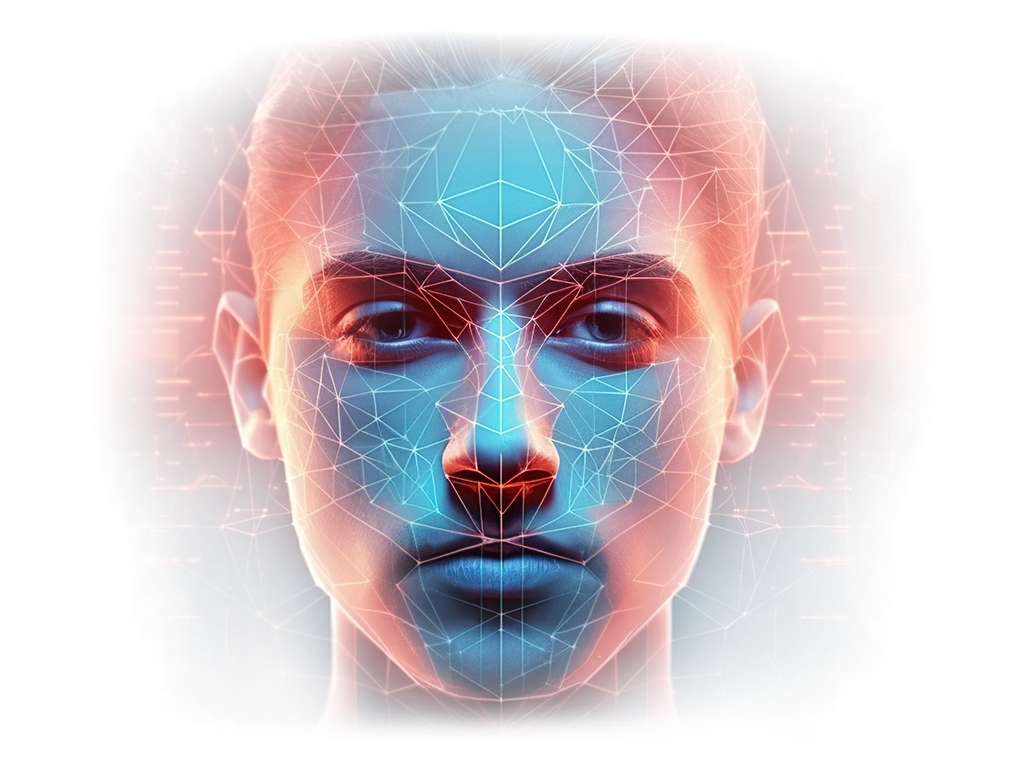
Feeling:
Feeling is primarily a process that takes place between the ego and a given content, a process, moreover, that imparts to the content a definite value in the sense of acceptance or rejection. Hence feeling is also a kind of judging, differing, however, from an intellectual judgment, in that it does not aim at establishing an intellectual connection but is solely concerned with the setting up of a subjective criterion of acceptance or rejection.
Sensation:
Sensation is that psychological function which transmits a physical stimulus to perception. Not only to the outer stimuli, but also to the inner, i.e. to changes in the internal organs. Primarily, therefore, sensation is sense-perception, i.e. perception transmitted via the sense organs and bodily senses. Also, since the process of conscious perception is a psychological phenomenon representing a physical phenomenon, and not the physical phenomenon itself, Jung says: "On the one hand, it is an element of presentation, since it transmits to the presenting function the perceived image of the outer object; on the other hand, it is an element of feeling, because through the perception of bodily changes it lends the character of affect to feeling.”
Intuition:
Intuition is that psychological function which transmits perceptions in an unconscious way. Everything, whether outer or inner objects or their associations, can be the object of this perception. Intuition has this peculiar quality: it is neither sensation, nor feeling, nor intellectual conclusion, although it may appear in any of these forms.

Extraverted Thinking:
They rely on object and objective data. An objective idea is equally determined by external data or borrowed from outside even when it is subjectively sanctioned. Extraverted thinking need not necessarily be purely concretistic thinking, it can just as well be purely ideal thinking. By what criterion does it judge–does it come from outside, or is its origin subjective? What direction does it take in drawing conclusions, whether it is directed outwards or not? Extraverted thinking comes into existence only when the objective orientation predominates. They have to have a different standpoint, a standpoint of their own. Because of this different standpoint, they see only the outward aspect, not the essence, whereas the thinker themselves can apprehend its essence but not its outward aspect. Extraverts need the influence of the introverted and vice versa.
Extraverted Feeling:
Extraverted feeling is concerned with phenomena to be harmonious with its external environment. Jung writes of extraverted feelers as those where feeling loses its personal character - it becomes feeling per se; it almost seems as though the personality were wholly dissolved in the feeling of the moment. Now, since actual life situations constantly and successively alternate, in which the feeling-tones released are not only different but are actually mutually contrasting, the personality inevitably becomes dissipated in just so many different feelings.
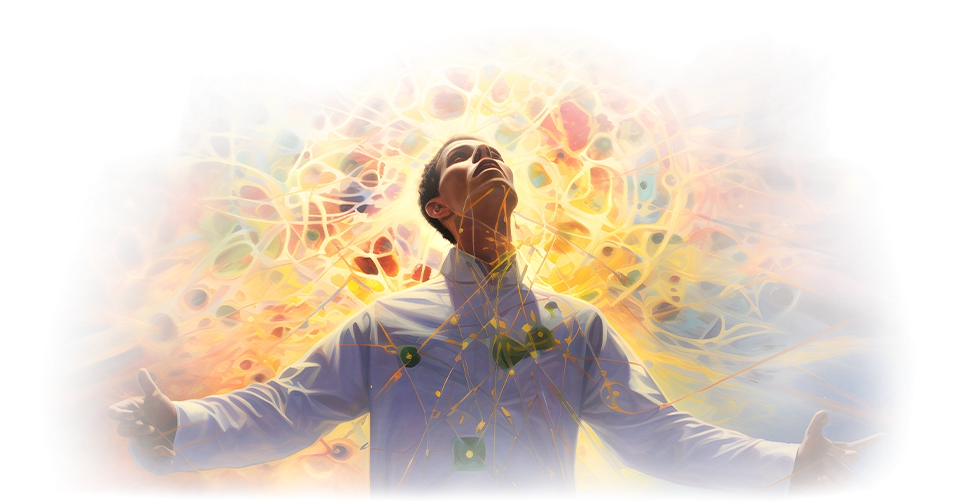
Extraverted Sensation:
Extraverted sensation is the sensing function that perceives phenomena in a realistic and concretist way. Since an extraverted sensor type's source of reward gravitates around perceiving and feeling external phenomena, he often has a good sense of aesthetics.
Extraverted Intuition:
Extraverted Intuition takes in intuitive information from the world around, Extraverted Intuition is concerned with the collective conscious. The collective conscious used by the Extraverted Intuitive, however, sees archetypes reflected through the subcultures, celebrities, organizations, events, and ideas of their times.

Introverted Thinking:
They rely on the subjective. The nature of introverted thinking means that it is primarily concerned with its subjective idea and insights gained by formulation over facts and objective data. Introverted Thinking is most similar to Rationalism. He is decisively influenced by ideas; these, however, have their origin, not in the objective data but in the subjective foundation. Like the extravert, he too will follow his ideas, but in the reverse direction: inwardly not outwardly. Intensity is his aim, not extensity. In these fundamental characters he differs markedly, indeed quite unmistakably from his extraverted parallel. Like every introverted type, he is almost completely lacking in that which distinguishes his counter type, namely, the intensive relatedness to the object.
Introverted Feeling:
Introverted feeling is continually seeking an image which has no existence in reality, but which it has seen in a kind of vision. It glides over all objects that do not fit in with its aim. It strives for inner intensity, for which the objects serve at most as a stimulus. The depth of this feeling can only be guessed—it can never be clearly grasped. It makes people silent and difficult to access; it shrinks back like a violet from the brute nature of the object in order to fill the depths of the subject. It comes out with negative judgments or assumes an air of profound indifference as a means of defense.

Introverted Sensation:
Introverted sensation is where the subject perceives the same things as everybody else, only, never stops at the purely objective effect, but concerns with the subjective perception released by the objective stimulus. Subjective perception differs remarkably from the objective. It is either not found at all in the object, or, at most, merely suggested by it. Subjective, or introverted, sensation apprehends the background of the physical world rather than its surface. The decisive thing is not the reality of the object, but the reality of the subjective factor, like the primordial images, which in their totality represent a psychic mirror-world. It is a mirror, however, with the peculiar capacity of representing the present contents of consciousness not in their known and customary form but in a certain sense sub species aeternitatis, somewhat as a million-year old consciousness might see them. Such a consciousness would see the becoming and the passing of things beside their present and momentary existence, and not only that, but at the same time it would also see that Other, which was before their becoming and will be after their passing.
Introverted Intuition:
Intuition, in the introverted attitude, is directed upon the inner object, a term we might justly apply to the elements of the unconscious. For the relation of inner objects to consciousness is entirely analogous to that of outer objects, although theirs is a psychological and not a physical reality. Inner objects appear to the intuitive perception as subjective images of things, which, though not met with in external experience, really determine the contents of the unconscious, i.e. the collective unconscious, in the last resort. Although this intuition may receive its impetus from outer objects, it is never arrested by the external possibilities, but stays with that factor which the outer object releases within. Introverted intuition apprehends the images which arise from the a priori, i.e. the inherited foundations of the unconscious mind. These archetypes, whose innermost nature is inaccessible to experience, represent the precipitate of psychic functioning of the whole ancestral line, i.e. the heaped-up, or pooled, experiences of organic existence in general, a million times repeated, and condensed into types. Hence, in these archetypes all experiences are represented which since primeval time have happened on this planet. Their archetypal distinctness is the more marked, the more frequently and intensely they have been experienced. The archetype would be—to borrow from Kant—the noumenon of the image which intuition perceives and, in perceiving, creates.
Types/Combinations:

Extraverted Thinking Type:
They base their ‘activities’ or actions on intellectual conclusions, they use objective knowledge and data as their foundation. Has an internal formula that determines good and evil, beauty and ugliness. They are strict with what is right and wrong, what confirms or contradicts their beliefs/formulas. Everyone and everything must obey this ‘formula’ or else they are wrong. This thinking type obeys it for their own good, so everyone else must obey it too. The formula is the universal law and anyone who opposes or does not obey it, is defying that law; those individuals who are insubordinate are therefore unreasonable, immoral and without conscience. His ideal is the purest conceivable formulation of object reality which therefore makes it the universally valid truth for the salvation of mankind. He stands for justice and truth. Don’t get too close to the center of their ‘power’ (where the formula operates), stay in the periphery. This type doesn’t like to be dependent on feeling(s), they repress things of illogical sense such as religious experiences or artistic sense, they are a rigid intellectual type. They believe that they are superior to feelings. They are positive thinkers, meaning they are also productive. The thinking of this type is the main channel into which his vital energy flows. This thinking/thought has a progressive, creative quality.
Feeling:
Oriented with objective data, the object being the indispensable determinant of the quality of feeling. Their feelings are always in accordance with the objective values, this type detaches from the subjective factor and entirely to the influence of the object. The valuations resulting from the act of feeling either correspond directly with the objective values or accord with traditional and generally accepted standards. Unconsciously egocentric. Overextraverted feeling may satisfy aesthetic expectations, but it does not speak to the heart; it appeals merely to the senses or only to reason.

Extraverted Feeling Type:
Follows feelings as a guide throughout life. Their personality appears adjusted in relation to external conditions, their feelings harmonize with objective situations and general values. Everything that fits into objective values is good and is loved and everything else seems to them seems a world apart. It is understandable that this type of thinking will be kept in abeyance as much as possible, this does not mean that they do not think, but their thinking comes in accordance with their heart. What they cannot feel, they cannot consciously think. To the observer, the display of feeling no longer appears as a personal expression of the subject but as an alteration of the ego– a mood. Thinking totally shuts out feeling if ever it wants to reach any kind of pure results, for nothing is more liable to prejudice and falsify thinking than feeling values. Logic nevertheless exists and enforces its inexorable conclusions, this must take place somewhere, and it takes place outside consciousness, namely the unconscious. The stronger the conscious feeling is and the more ego-less it becomes, the stronger grows the unconscious opposition. The unconscious thinking reaches the surface in the form of the obsessive ideas which are invariably of a negative and depreciatory character. The negative thinking utilizes every infantile prejudice or comparison for the deliberate purpose of casting aspersions on the feeling value, and musters every primitive instinct in the attempt to come out with “nothing but” interpretations.
Extraverted Sensation Type:
No one can match this type in realism, their sense for objective facts is extraordinarily developed. Their life is an accumulation of actual experiences of concrete objects. What they experience serves at most as a guide to fresh sensations; anything new that comes within their range of interest is acquired by way of sensation and has to serve its ends. This type is one who is inclined to regard a highly developed reality-sense as a sign of rationality, such people will be esteemed as very rational. Sensation is a concrete expression of life– it is simply real life lived to the full. This type seeks after concrete enjoyment in life, and their morality is oriented accordingly. This type is the lover of tangible reality, with little inclination for reflection and no desire to dominate; they enjoy feeling the object, to have sensations, and then enjoying them. Their love for enjoyment draws people to them, they make good company. This type is desirous of the strongest sensations, and these, by their very nature, they can receive only from outside. What comes from inside seems to him morbid and suspect. He reduces his thoughts and feelings to objective causes, to influences emanating from objects, quite unperturbed by the violations of logic. Their love is unquestionably rooted in the physical attractions of its object. They are considerate to others. They have no reason to act in any way contrary to the reality of things as they are. This type is compulsive, it is the unconscious counterpart of the easy-going attitude of the pure sensation type.

Extraverted Intuition Type:
This type is oriented by the object, there is a marked dependence on external situations, but it is altogether different from the dependence of the sensation type. This type is never to be found in the world of accepted reality-values, they have a keen nose for anything new and in the making. They are always seeking out new possibilities, stable conditions suffocate them. They have a hard time with long term goals, they oftentime pursue things with great enthusiasm only to abandon them without any compunction. Neither reason nor feeling can restrain or frighten them away from a new possibility even though it goes against all his previous convictions. This type has a lack of judgment. They also have their own characteristic morality which consists in a loyalty to their vision and in voluntary submission to their vision’s authority; they are not very inconsiderate of others. They are seen as immoral and unscrupulous adventurers. This type is important economically and culturally; they are exceptional initiators and promoters of enterprises as well as they are ‘champions’ of minorities with a future; they are able to make intuitive ‘diagnosis’ of their abilities and potentialities. They are capable of inspiring courage in others and kindle enthusiasm for anything new. The stronger their visions and intuition are, the more egotistical they become, but they bring their visions to life and are passionate and embody them. However, they tend to create and envision things that they don’t stick around long enough to see or be a part of; they run after new things constantly and never stop to see what they have created. This can oftentimes make them feel very empty and unfulfilled. Their conscious attitude towards both sensation and object is one of ruthless superiority. They do not necessarily mean to be ruthless or superior— they simply do not see the object everyone else sees and rides roughshod over it, just as the sensation type has no eyes for its soul.

Introverted Thinking Type:
this type is very strongly influenced by ideas, the origin of those ideas however are in their subjective foundation, not objective data. They follow their ideas inwardly; intensity in their aim rather than extensity. They may be polite, amiable, and kind, but one is constantly aware of a certain uneasiness betraying an ulterior motive– the disarming of an opponent, who must at all costs be pacified and placated lest they prove themself a nuisance. They won’t shrink from no danger in building up their world of ideas, and never shrinks from thinking a thought because it might prove to be dangerous, subversive, heretical, or wounding to other people’s feelings, they have nonetheless beset by the greatest anxiety if ever they have to make an objective reality. That goes against the grain. They put their ideas into the world and get really annoyed when they fail to thrive on their own account. If in their eyes what they say and do are true, then it must be so in practice, and others have to bow to its truth. This type is stubborn, headstrong, and unamenable to influence. This type tends to not see that they are being wronged in practice, for to them the relation to people and things is secondary and the objective evaluation of their product is something they remain unconscious because they think out their problems to the limit, they complicate them and constantly get entangled in their own scruples and misgivings. They tend to have difficulty when they bring themselves to admit that what is clear to them, may not be equally clear to everyone else. When it comes to their personal relationships and relations with people, they are shy or they can throw themselves at people who cannot understand them. If they think they are understood, they can easily become arrogant. They can be very clueless when it comes to relationships and can easily be taken advantage of. He can seem to others inconsiderate and domineering, prickly, unapproachable, and arrogant, but for those who have stuck with them know value this type’s intimacy and friendship. This type is antisocial. This type relies on his close relationships and lashes out at what seems to be insignificant things, they begin to confuse their subjective truth to their own personality. Their original ideas become destructive, poisoned by a sediment of bitterness. Their struggle against the influences emanating from the unconscious increases with their external isolation, until finally they begin to cripple them. They think their withdrawal into ever-increasing solitude will protect them from the unconscious influences, but it only plunges them deeper into the conflict that is destroying them from within. This type is positive and synthetic in developing ideas.

Introverted Feeling Type:
This type is mostly silent, inaccessible, and hard to understand. They often hide behind childish or banal masks, and their temperament is inclined to melancholy. They are mainly guided by their subjective feelings, their true motives generally remain hidden.Their outward demeanor is harmonious, inconspicuous, giving an impression of pleasing repose, or of sympathetic response, with no desire to affect others, to impress, influence, or change them in any way. If this outward aspect is more pronounced, it arouses a suspicion of indifference and coldness, which may turn into a disregard for the comfort and well-being of others. Faced with anything that might carry them away or arouse enthusiasm, this type observes a benevolent though critical neutrality, coupled with a faint trace of superiority that soon takes the wind out of the sails of a sensitive person. As far as possible the feeling relationship is kept to the safe middle path, all intemperate passions being resolutely tabooed. Expressions of feeling therefore remain stingy, and the other person has a permanent sense of being undervalued once they become conscious of it. This type appears cold and reserved, making it seem like they have no feelings at all; however, the truth is their feelings are intensive rather than extensive. They develop feelings in depth. While an extensive feeling of sympathy can express itself in appropriate words and deeds, and thus quickly gets back to normal again, an intensive sympathy, being shut off from every means of expression, acquires a passionate depth that comprises a whole world of misery and simply gets benumbed. To the outside world this intensive sympathy looks like coldness because usually it does nothing visible, and an extraverted consciousness is unable to believe in invisible forces. The real object of this feeling is only dimly divined by the normal type. A trace of it nevertheless seeps through into the personal effect they have on people in the form of a domineering influence often difficult to define (A trace of a tendency to overpower or coerce another person with their “secret feelings” ). It is sensed as a sort of stifling or oppressive feeling which holds everybody around them under a spell. This type has a “mysterious power” that is fascinating to extraverts; this power comes from deeply felt, unconscious images, but consciously they are apt to relate it to the ego, whereupon her influence becomes debased into personal tyranny. The mysterious power of intensive feeling turns into a banal and overweening desire to dominate, into vanity and despotic bossiness. This type is known for their unscrupulous ambition and mischievous cruelty. They feel what other people think.
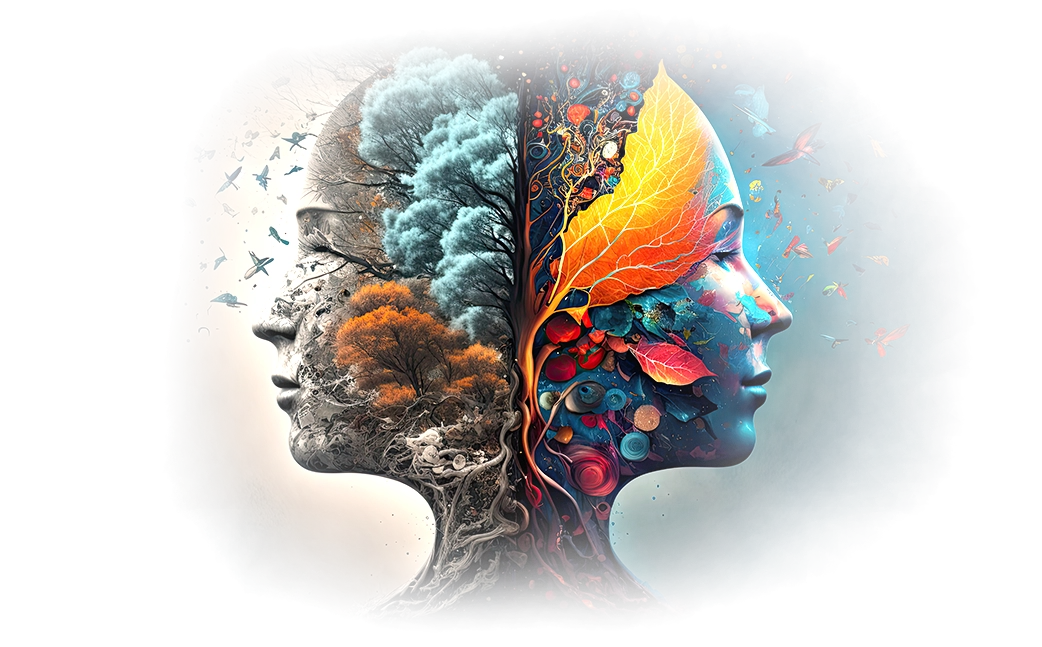
Introverted Sensation Type:
This type is guided by the intensity of subjective sensation excited by the objective stimulus. No proportional relation exists between object and sensation, but one that is apparently quite unpredictable and arbitrary. They may be conspicuous for their calmness and passivity or for their rational self-control. This type has a difficulty in expressing themselves. There is an unrelatedness to objects; normally the object is not consciously devalued in the least, but the stimulus is removed from it and immediately replaced by a subjective reaction no longer related to the reality of the object. Objective stimulus is absolutely necessary to sensation and merely produces something different from what the external situation might lead one to expect. This type notices everything and takes it in, they get impressions which translate from the object to the subject. They have a slow conscious function, but their unconscious function is always interpreting things and processing things on the interior. This type’s superior function is introverted, their intuition is extraverted and therefore is generally triggered off by outer events. Their development alienates them from the reality of the object, leaving them at the mercy of their subjective perceptions, which orient their consciousness to an archaic reality, although their lack of comparative judgment keeps them wholly unconscious of this fact. This type lives in their own world and processes things on their own time. Their sensations are different from reality. Their unconscious is distinguished chiefly by the repression of intuition which consequently acquires an extraverted and archaic character.

Introverted Intuition Type:
This type can be seen as a mystical dreamer and seer while also an artist and crank. The artist might be regarded as the normal representative of this type which tends to confine itself to the perceptive character of intuition. The intuitive stops at perception; perception is their main problem as well as the shaping of perception. The moral problem arises when the intuitive tries to relate themselves to their vision when they are no longer satisfied with mere perception and its aesthetic configuration and evaluation. The pure intuitive who represses their judgment, or whose judgment is held in thrall by their perceptive faculties, never faces this question squarely since his only problem is the “know-how” of perception. They find the moral problem unintelligible or even absurd and as far as possible forbids their thoughts to dwell on the disconcerting vision. They reflect on the meaning of their visions and they are less concerned with developing its aesthetic possibilities than with the moral effects which emerge from its intrinsic significance. Their judgment allows them to discern though often only darkly that in their vision that it is not just an object to be perceived, but wants to participate in the life of the subject. They transform their vision into their own life, they tend to rely predominantly on their vision, their moral efforts become one-sided; they make themselves and their life symbolic– adapted to the inner and eternal meaning of events, but unadapted to present-day reality. This type speaks words ahead of their time, a sort of language that no one understands yet, and they lack the convincing power of reason. They are often a frequently misunderstood geniuses. This type represses most of all is the sensation of the object, and colors their whole unconscious. It gives rise to an extraverted sensation function. The unconscious personality can best be described as an extraverted sensation type of a rather low and primitive order. Instinct and intemperance are hallmarks for sensation combined with an extraordinary dependence on sense-impressions.
Jungian Typology, MBTI, and the Court
Cards of the Tarot
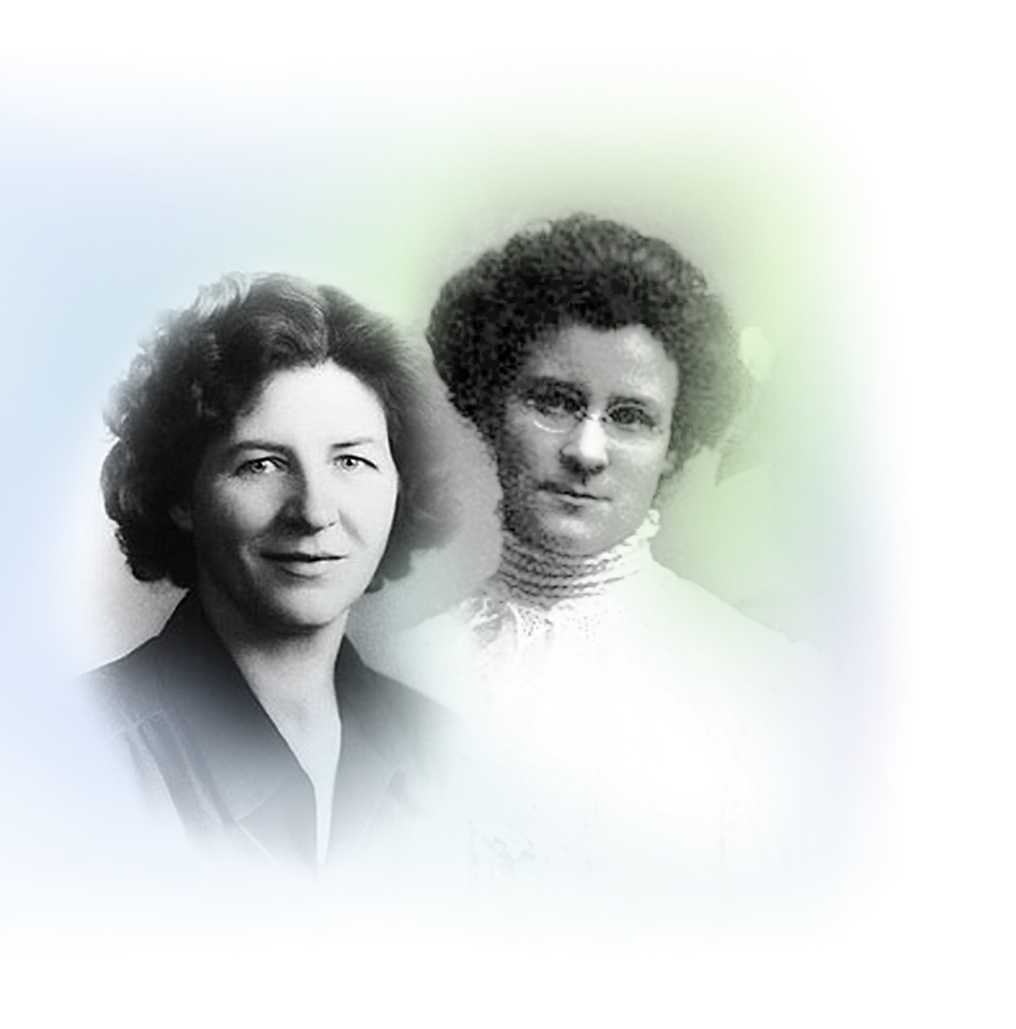
Carl Gustav Jung was a brilliant psychiatrist who created and established the longstanding foundation for human typology and psychological types with Extraverted/Introverted, Intuition/Sensation, and Feeling/Thinking that work alongside and coexist with the Court Cards of the Tarot. The typology coexist with the Court Cards because the versions of the Cards most prominently discussed by Aleister Crowley match up with the types that Jung presents; for example, “Wands” matches up with the “INtuition” or intuitive function that Jung described, “Cups” coexist and work alongside “Feelings”, “Swords” with “Thinking”, and “Pentacles” with “Sensation”. While Tarot Cards have existed for hundreds of years, their interpretations have varied but Aleister Crowley’s interpretation has been the most accurate in terms of their relation to Jungian typology and how people interpret themselves and others.
When it comes to the Tarot Cards and being able to correctly and effectively read the cards, it can be difficult as human psychology shifts from childhood to adolescence to adulthood to old age which alters the meaning and understanding of the Cards. What is meant by this is that a person could be a “Princess” when they are younger because oftentimes this card represents young energetic people who are in the process of developing a sense of self, but as they grow older they may shift to being a more practical, sturdy, and extraverted individual progressing into adulthood like a “Knight”.
Aside from consulting the zodiac, there is the newer method of assigning Tarot Court Cards from the principles of modern psychology, the method is the MBTI (Myer-Brigg Type Indicator). This method is a behavioral test that an individual takes which accurately describes in detail their personality along with their strengths and weaknesses, romantic relationships, careers, and an in-depth introduction to their personality type. Oftentimes this test is used by employers to gauge how compatible an individual is with the company and other people in the officeor organization. MBTI’s foundation is based on the work by C.G. Jung about how human psychology in general is based on the four cognitive functions: feeling, sensation, intuition, and thinking. These four cognitive functions are then taken in two directions, being either introverted or extraverted; combined with the four cognitive functions and the two directions, it creates, in total, 8 major functions.Isabel Myers and Katherine Briggs then added an additional set of secondary personality types: evaluation and reception that also show extroverted and introverted nature. Thus now creating 16 personality types, each corresponding with the 16 Court Cards of the Tarot.
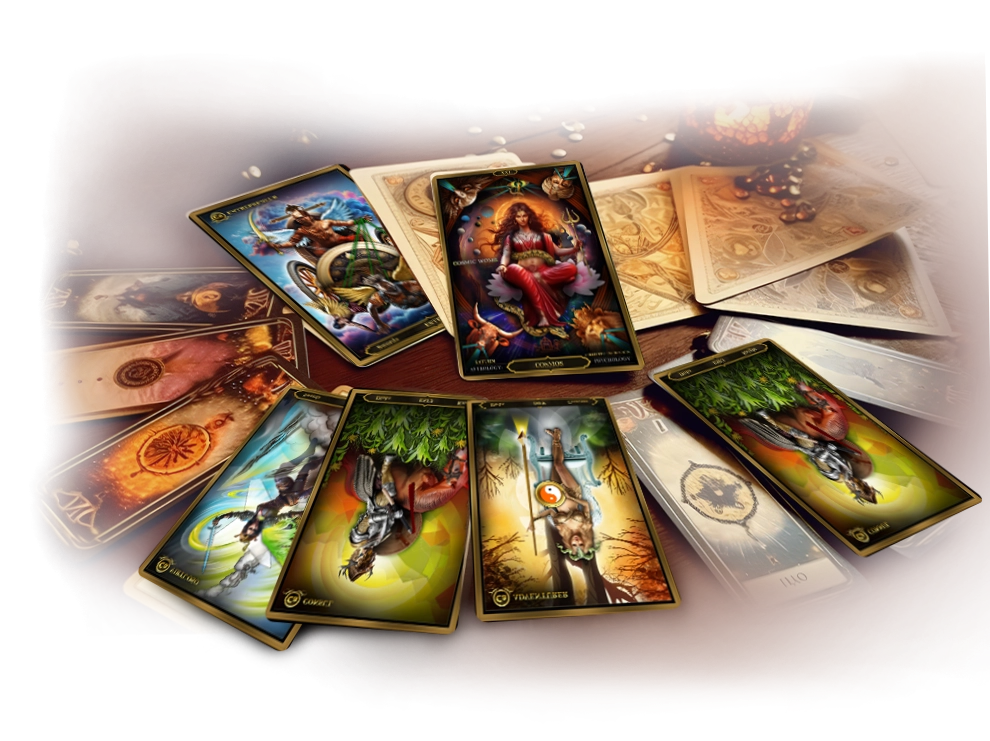
If one stops to think about what they have learned in regard to “personality types” of the Tarot Cards they are based on level, suit, and astrology. As mentioned briefly above, the Court Cards of the Tarot correspond with the personality types in MBTI. For example, Queens and Princesses are people who are more concerned with internal matters, one can consider them introverted and then with Knights and Princes they are concerned with external matters in the kingdom and protecting their people they can be considered extraverted. Then together Knights and Queens are generally portrayed as old and experienced and who are dominated by judgments while Princes and Princesses tend to be aware.
Based on what was discussed in the paragraph above, an example would be the Princess of Pentacles, which is dominated by the Earthy part of Earth, who is ISFP: Introvert (I), Sensation (S), Feeling (F), and Prospecting (P). Between Jungian typology, MBTI, and the Court Cards of the Tarot it can be seen that at some point they all interact and connect with one another, they all intertwine with one another because they all have the same objective in mind: helping others understand themselves better as well as everyone they surround themselves with.
Tarot Cards version of MBTI
Wands Tarot cards
Intuition
Cups Tarot cards
Feelings
Swords Tarot cards
Thinking
Pentacles Tarot cards
Sensing
Furthermore, 16 MBTI personality types are identified by the Myers-Briggs method corresponding to 16 Tarot Court cards. If we stop to think about what we have learned about the “personality types” of cards based on level, suit, and astrology, we can understand which card corresponds to which personality type in MBTI. For example, Kings and Knights, conquerors and rulers in nature, canbe considered “extrovert” ; Queens and Pages, more interested in internal matters, can be considered “introverted”. Kings and Queens, old and experienced, are often dominated by “judgments,” while Knights and Pages tend to “be aware”.
Thus, based on each pair above, we may have noticed the Knight of Wands, dominated by Air-Fire, is an Extrovert (E), iNtuition (N), Thinking (T) and Judgment (J). Therefore, “ENTJ” is the type of personality of the King of Wands.
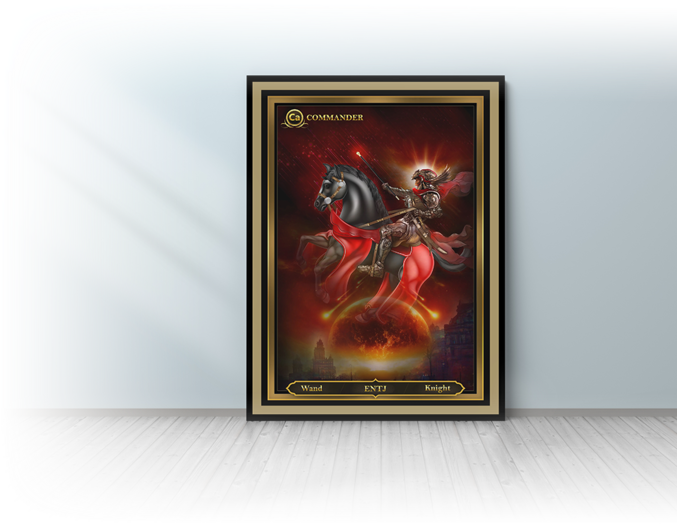
Knight of Wands (ENTJ-Commander)
E=Extraverted, N=INtuition, T=Thinking, J=Judging
Fiery part of Fire. This type are natural-born leaders, they are people who are determined and enjoy achievement. This is the Fire element which is accompanied with a strong, dominant personality that feeds into their leadership style. People with this personality type embody the gifts of charisma and confidence, and project authority in a way that draws crowds together behind a common goal. These people seek out challenges whether they are large or small, they have an internal drive that pushes them to achieve their goals no matter what it takes and they personally believe they can accomplish anything they set their minds to. This personality is relentless and unforgiving, they push towards their goals with sheer willpower. Their confidence can oftentimes lead to pride in themselves and their abilities. With their fierce determination, this personality type oftentimes pushes people along when them, achieving spectacular results in the process. ENTJs are natural team-builders, they have a talent for seeing potential in individuals. A flaw that this type has, however, is they call out the failures of others with cold insensitivity which therefore creates an aura of a “larger than life” persona. They see displaying emotions as a sign of weakness. They are true powerhouses, but they need a team to work with and share their successes with, they are incredibly powerful but need to also recognize their support system. This personality type can seem or even become arrogant and condescending towards others.
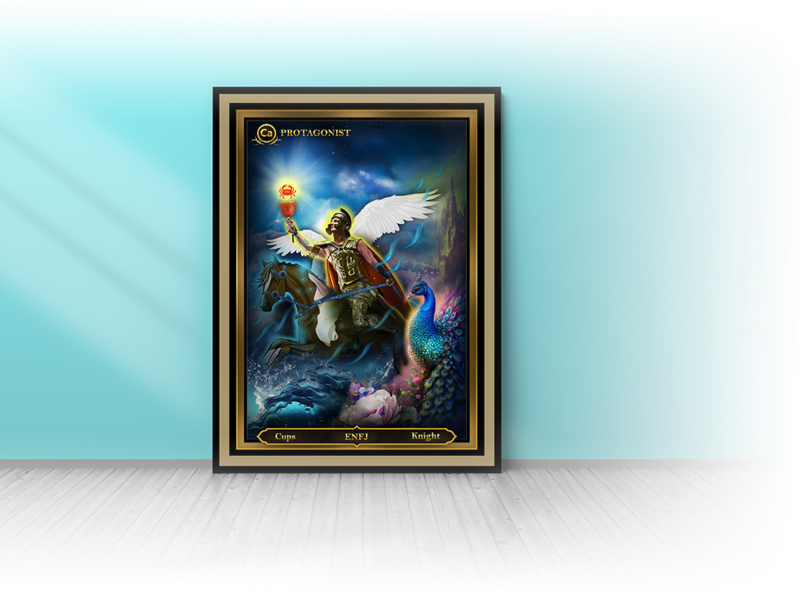
Knight of Cups (ENFJ- Protagonist)
E=Extraverted, N=INtuition, F=Feeling, J=Judging
Fiery part of Water. The ENFJ personality type are the warm, welcoming, amiable, and sincere individuals who find joy and passion in helping others. This type of person has strong values, ethics, and ideas that are contagious to those around them; they are natural leaders who have a knack for creating an environment where they teach because they rarely shy away from doing what is morally correct. These people find great joy in helping to guide their loved ones and people they hold dear to their heart to grow and change into being their best and most genuine selves. This type does not feel the need to be the center of attention, they like to play their roles in the background, they do not require praise for their actions. ENFJ has a way with words where people listen to what they have to say, they have a certain sensitivity with their vocality which resonates with others in a way that they remember. The ENFJ are authentic and altruistic people who genuinely care for others, they make it a goal and priority in their life to give aid to anyone and everyone. They are pure individuals, and they have pure intent behind their actions and their words, they have the desire and motivation to help others and have no ulterior motives behind their actions. However, if this personality pushes too hard on certain matters, those around them often feel poorly and unfairly judged; some people also feel like this personality type can be preachy and domineering. But this personality type is passionate about what they believe in and what they believed to be right, and they will fight for what they know to be true.
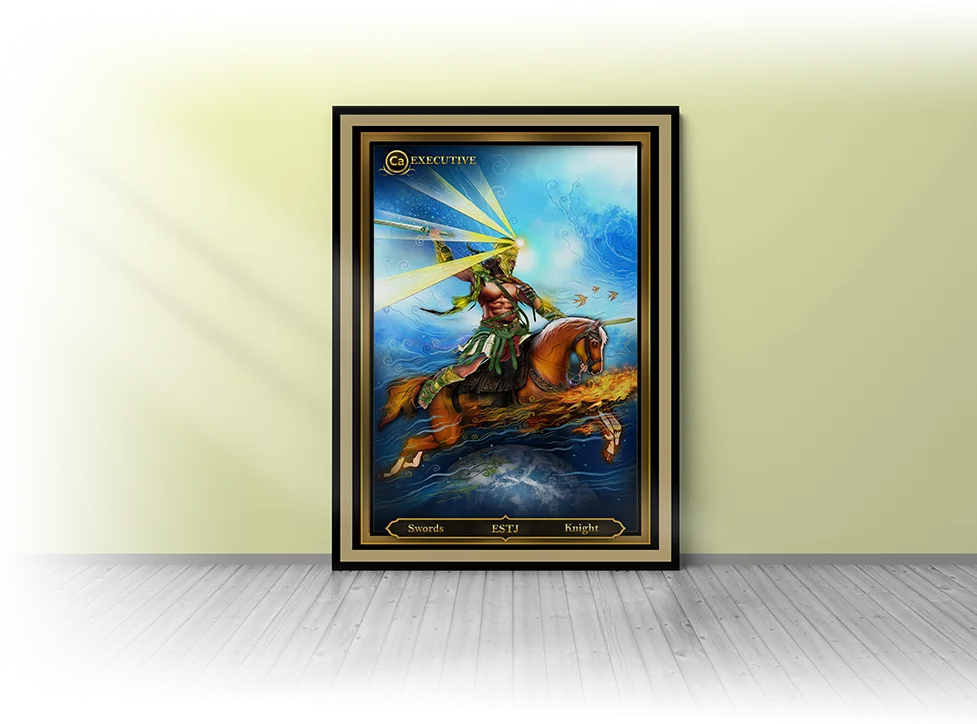
Knight of Swords (ESTJ- Executive)
E=Extraverted, S=Sensation, T=Thinking, J=Judging
Fiery part of Air. This type has a practical and pragmatic personality, they follow their own sense of judgment. They are a supporter and upholder of tradition and order, they are the embodiment of honesty, dedication, and dignity, and they speak with clear advice and guidance. They have a strong leadership role, they lead by example where they demonstrate dedication and loyalty. Other people tend to rely on this personality type to guide and direct them through adverse times, people trust in this type to make the best decisions. They make order out of chaos. The ESTJ are very knowledgeable and live in a world of clear facts, they stick to what they genuinely believe in because even in resistance they have facts and knowledge to counter it. However, they do not tolerate laziness especially in the workplace. They also expect their dedication and reliability to be reciprocated, and if it is not this type tends to lash out and gain the reputation of being inflexible and cruel in the sense of how heshe communicates with others. This type are strong believers in the rule of law and authority which is to be earned.
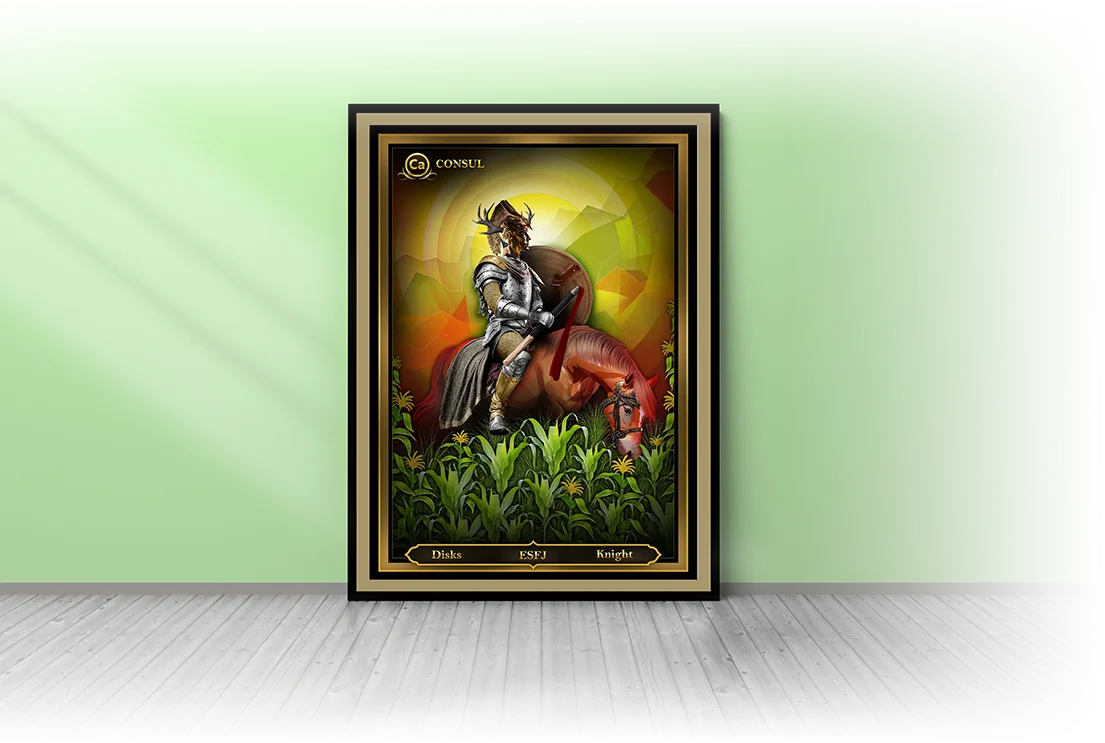
Knight of Pentacles (ESFJ- Consul)
E=Extraverted, S=Sensation, F=Feeling, J=Judging
Fiery part of Earth. This type is a very sociable person who deeply cares about other people, and wants to help and serve them in any way that he/she can. An ESFJ is very generous with their time and abilities especially when it comes to helping others. However, if their abilities and generosity are forgotten or go unnoticed they take it personally and it tends to damage their self-esteem as well as they lash out aggressively because of it. This type is loyal to their core and will do anything for their loved ones and friends. This type is really good at giving advice to others because they feel that it is their duty and they are the type of people who genuinely wants to help. They are selfless and opinionated, but if one disagrees with them, they struggle to accept that they may be wrong. They also might come off as self-righteous because they have a tendency to judge others and the path that they’re on as they are ‘misguided’. An ESFJ has a profound respect for tradition and doing things the conventional way. They have a high tendency to build long-lasting and loving relationships with others and they stay loyal to those people forever, even when they are no longer needed or available. They find peace and happiness when they focus on what they love to do, which is setting an example of love and care, being considerate, and being responsible.
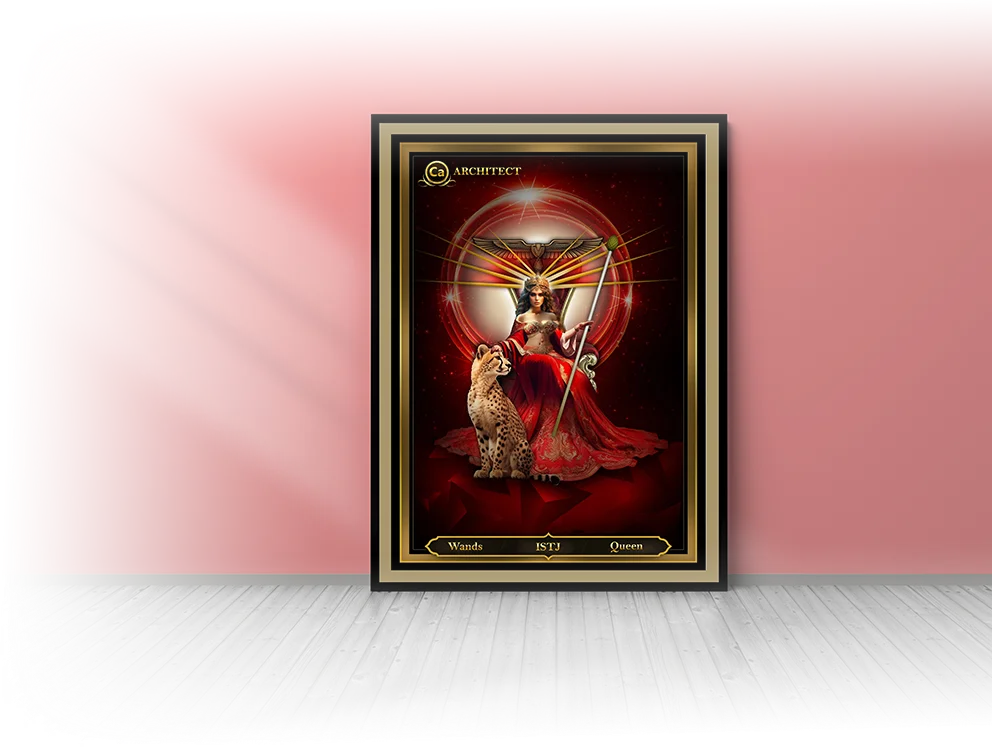
Queen of Wands (INTJ- Architect)
I=Introverted, N=INtuition, T=Thinking, J=Judging
Watery part of Fire. This type of person is a tactician through and through, they apply creativity and rationality to every aspect of their life. While their personal lives may be private and complex, but in public settings their confidence, quick wits, and rationality draws others to them. This type is adaptable, has persistent energy, and has calm authority. This personality type draws their self-esteem and self-confidence from their vast knowledge and intelligence, they can ruin themselves if they cannot meet their own expectations for themselves. The INTJ acts and does everything independently, relying only on their own intellect, and they may come across as rude or offensive when they are only trying to be honest, they sometimes come off as snobbish. They can also be seen as perfectionists, needing to do most things by themselves. INTJ are tactical in the way that they make decisions because they contemplate the pros and cons in every situation before they make their move. They have a drive to be successful as well as inventive, they have a single-minded drive in all that they do. This type is kind yet is impatient when it comes to being opposed by others. They have a vast capacity for friendship and love, but they have to be the ones to initiate it all.
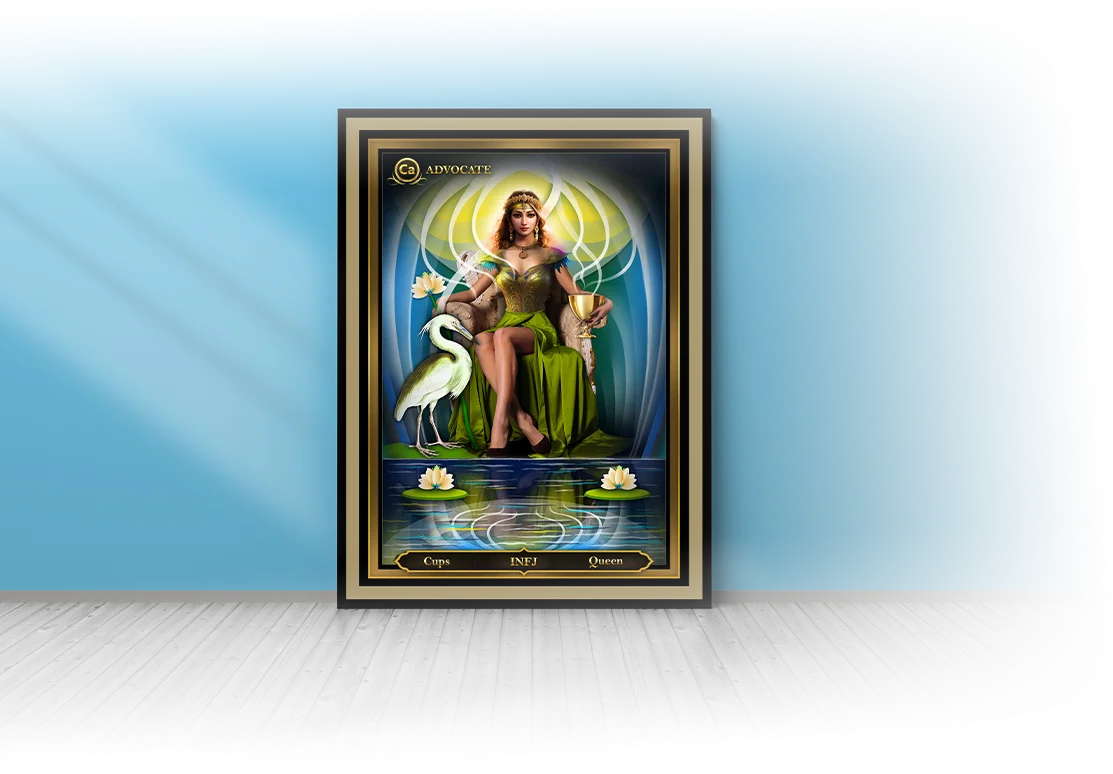
Queen of Cups (INFJ- Advocate)
I=Introverted, N=INtuition, F=Feeling, J=Judging
Watery part of Water. This is a rare type, they tend to have a deep thoughtfulness and imagination concerning their approach to life. They have deep inner values and visions as well as humanism that guides and directs them in all that they do. This type wants to make a real difference in the world, they don’t sit and watch as their life goes by. They are creative, have great imaginations, and are very sensitive. They are also very patient. They have a passion for helping others and being a good force in the lives of others. The INFJ have a clear sense of purpose and stick to their values, that’s what leads them through life. Since this is an Introverted type, they need time to themselves to reflect on their life and their role in the world. While the majority of the time they are focused on others, they need to remember to find time to take care of themselves. They may focus so intently on their ideals that they don’t take adequate care of themselves – a pattern that can lead to stress and burnout. This type balances logic and their emotions, the head and the heart, and they try to correct the fallacies in the world paying no attention to how large or small the issue is. They find joy in uplifting others and spreading compassion; this type enjoys meaningful conversations and they tend to communicate in a way that is warm and sensitive which therefore resonates with the people they connect with.
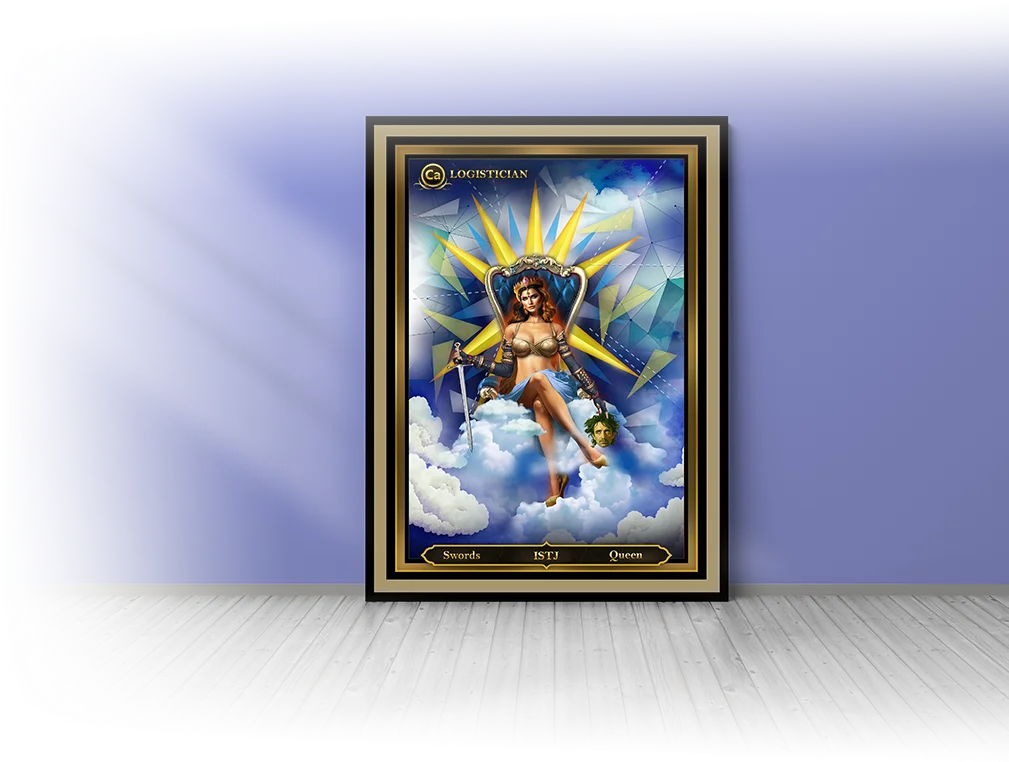
Queen of Swords (ISTJ: Logistician)
I=Introverted, S=Sensation, T=Thinking, J=Judging
Watery part of Air. This type is reserved, methodical, and has a rational outlook on life. The ISTJ are logical and believe that there is a correct way to go about things in any and every situation. They stay grounded in every situation and use their practical skills to work through problems which earns respect from those around them. These individuals find comfort in structure and traditions. These are highly dependable people who stay loyal to their friends and family, they often offer clarity in murky situations. An ISTJ, however, has a tendency to misjudge people who cannot mirror their self-control; if they suspect that someone is lazy or dishonest (ISTJ strongly believe in honesty and integrity) when the ISTJ does not know their situation, they don’t vocalize their disdain but one can catch onto their feelings which gives them a reputation of being strict and unempathetic. An ISTJ has a very strong work ethic and sense of duty that some people take advantage of, an ISTJ sometimes shoulders a lot of other people’s responsibilities. This type has a pragmatist personality which gives them a great sense of organization, they find great passion in creating order and harmony in situations that are chaotic.
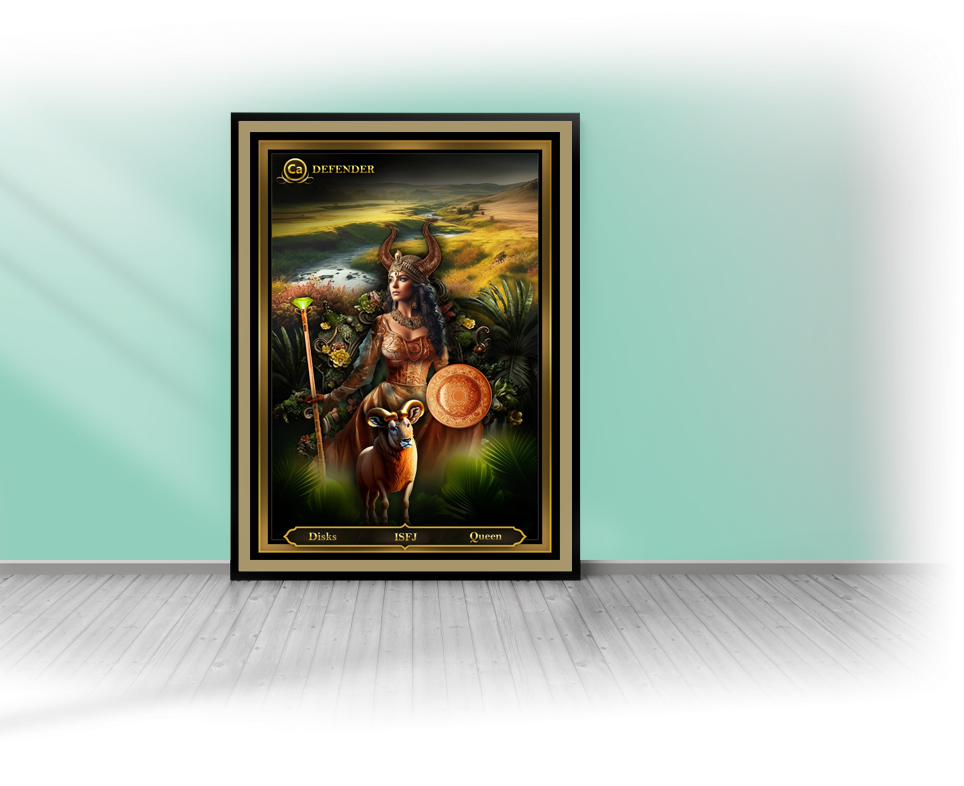
Queen of Pentacles (ISFJ: Defender)
I=Introvert, S=Sensation, F=Feeling, J=Judging
Watery part of Earth. This type are efficient and responsible, they are warm and humble in their own way. They are very hardworking and devoted to people, especially their close friends and family, they feel a special sense of duty to those they surround themselves with. An ISFJ tends to help those around them reach their full potential, they serve everyone and do not seek or need recognition for their help. This personality type is fiercely loyal, they drop whatever they are doing to give a hand to their friends or family. They take their responsibilities very seriously, they are devoted to every task they are given. They have obtained and honed developed people skills as well as social relationships. They are sensitive and caring people who have a special ability to make those around them feel cherished and valued. On the other hand, sometimes they bite off more than they can chew and can feel guilty, stressed, and burnt out. They can be seen as perfectionists because they have a tendency to be meticulous with the details of things. They are also slow to adapt to changes, which can bring immense stress into their lives.
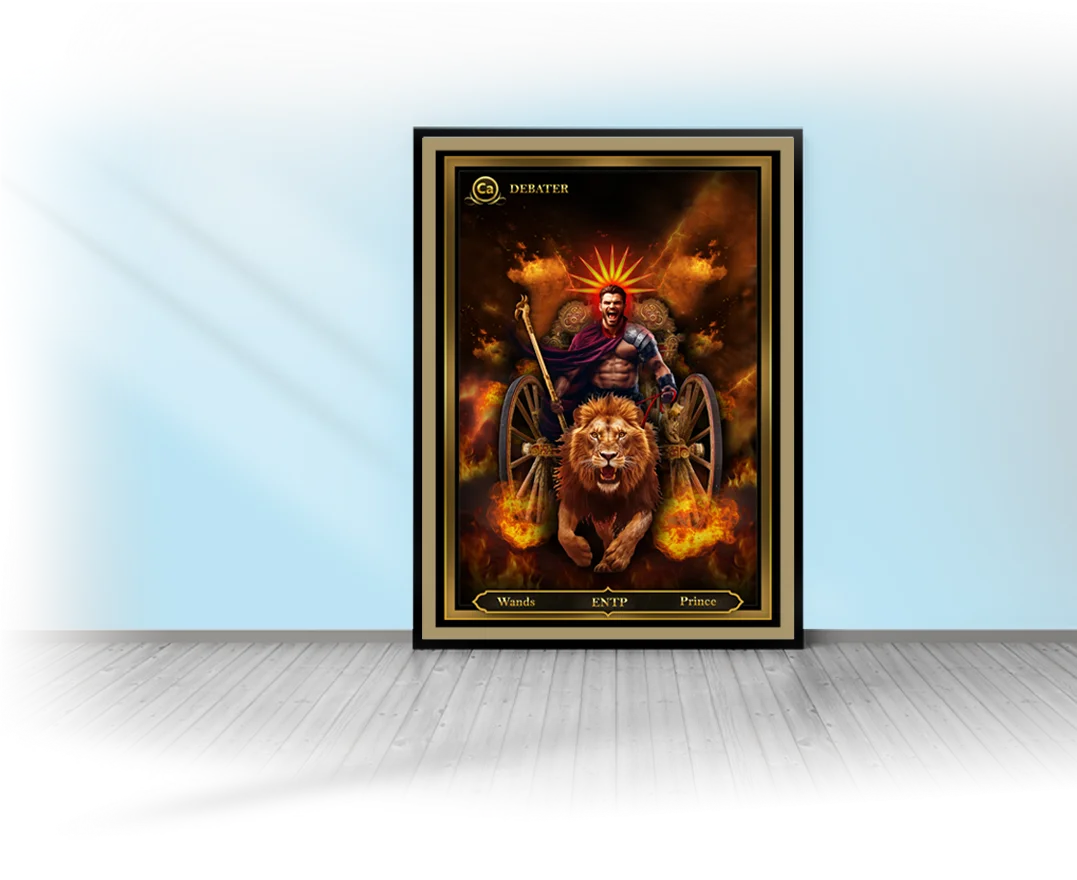
Prince of Wands (ENTP: Debater)
E=Extraverted, N=INtuition, T=Thinking, P=Prospecting
Airy part of Fire. This personality type is very strategic, deconstructing and rebuilding ideas with great mental agility. They tend to be creative and bold with a great, playful sense of humor and are highly entertaining. Their idea of fun generally has to do with a spirited debate of sorts. This type has a sincere heart seeking to benefit everyone. While they quarrel and debate most everyone, people can only have their ideas challenged for so long, so oftentimes an ENTP can burn bridges easily. They are quick-witted and fearless, they are not afraid to push back against societal norms. An ENTP does not have boundaries, they often seek out challenges and seek to challenge everything, this goes with their rebelliousness. People with this personality are very knowledgeable and eager to learn new things. These individuals are confident, intelligent, and have a keen sense of humor, but unless they cultivate a bit of sensitivity, they may struggle to maintain deeper relationships to achieve their goals. This type does not conform to society or the norms they set for people. The ENTP feels that people too often succumb to pressures and standards of society, they want to be the people that stand out against the crowd and do their own thing. They explore new perspectives, they recognize the value of consideration and compromise alongside logica and progress. However, this personality may seem controversial, self-righteous, and unrealistic.
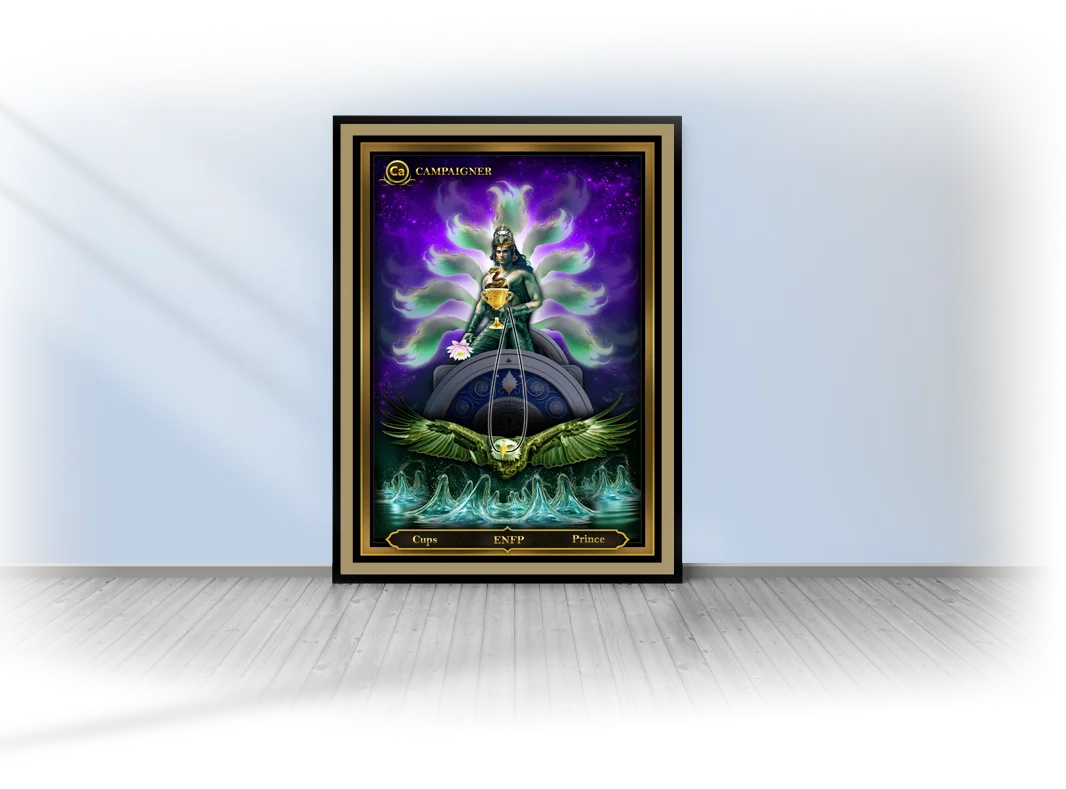
Prince of Cups (ENFP: Campaigner)
E=Extraverted, N=INtuition, F=Feeling, P=Prospecting
Airy part of Water. This individual has and embraces ideas bigger than this world which reflects their sense of hope and compassion towards others. These types of people are the true free spirits who are unreserved, accepting, and kind. An ENFP longs for a deep, meaningful connection and relationship with people, they are friendly and they want to enrich the lives of the people they surround themselves with. They are both vibrant on the exterior as well as the interior, their hearts are pure and believe that everything is connected. They have an inspiring personality that attracts others to them, they inspire others to open their hearts and minds to new possibilities and they try to help bear the burdens and problems of others. However, this type tends to struggle with self-discipline and consistency, they also read too much into other people’s actions. They have a habit of overthinking a situation and try too hard to please those around them, they become unfocused and disorganized. But they enjoy exploring new and different kinds of relationships and ideas, they genuinely believe that everyone deserves to express their feelings and desires.
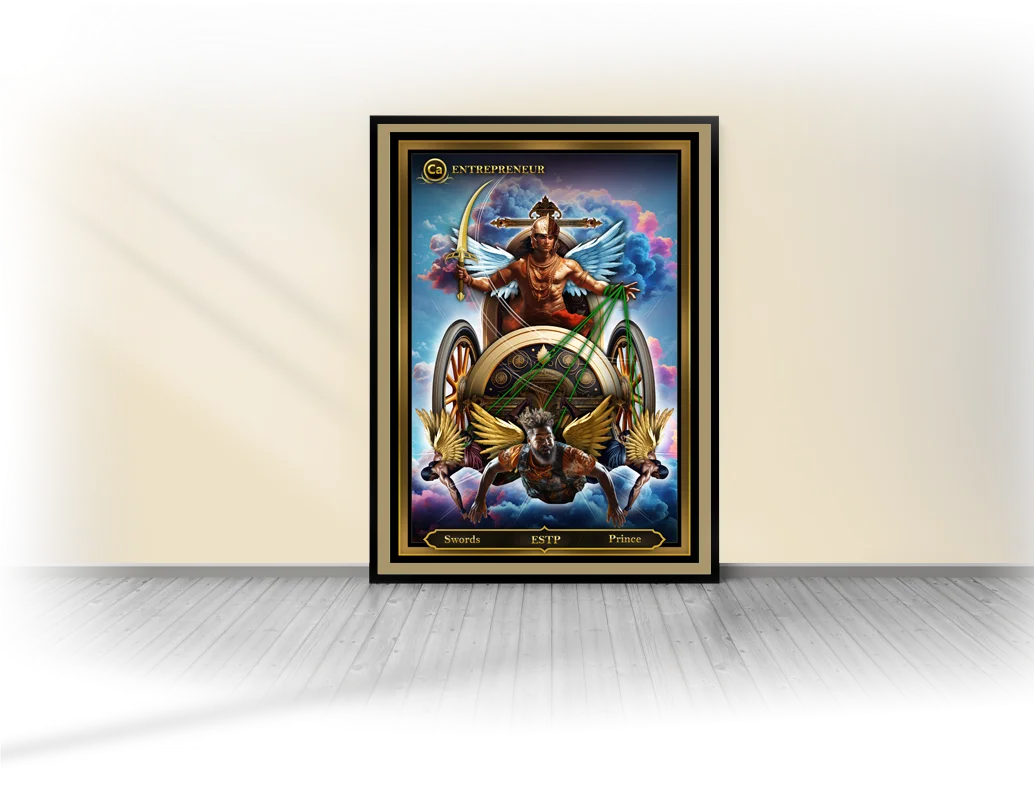
Prince of Swords (ESTP: Entrepreneur)
E=Extraverted, S=Sensation, T=Thinking, P=Prospecting
Airy part of Air. This type are the energetic, confident, and action-oriented people who navigate any problem they are faced with. This is the type who loves to be the center of attention, has an odd sense of humor, and is a person people admire. An ESTP acts before thinking, they try to fix their mistakes as they go along, they make their lives based around risky behavior. They are impulsive, and even though they have good intentions, it can lead to a thoughtless decision. They have their own internal, moral compass that guides and directs them through life. This type enjoys drama and passion which are appealing to their logical minds. An ESTP is very perspective and often notices small details and changes in a person, they are very observant. This type calls out the changes they see without thinking about the consequences, giving others the impression that this type is insensitive. This type often gets stuck in the moment and forgets to take care of their own health and safety. An ESTP is inspiring which makes them a natural leader pulling everyone along the less traveled path. They tend to bring excitement and life everywhere they go.
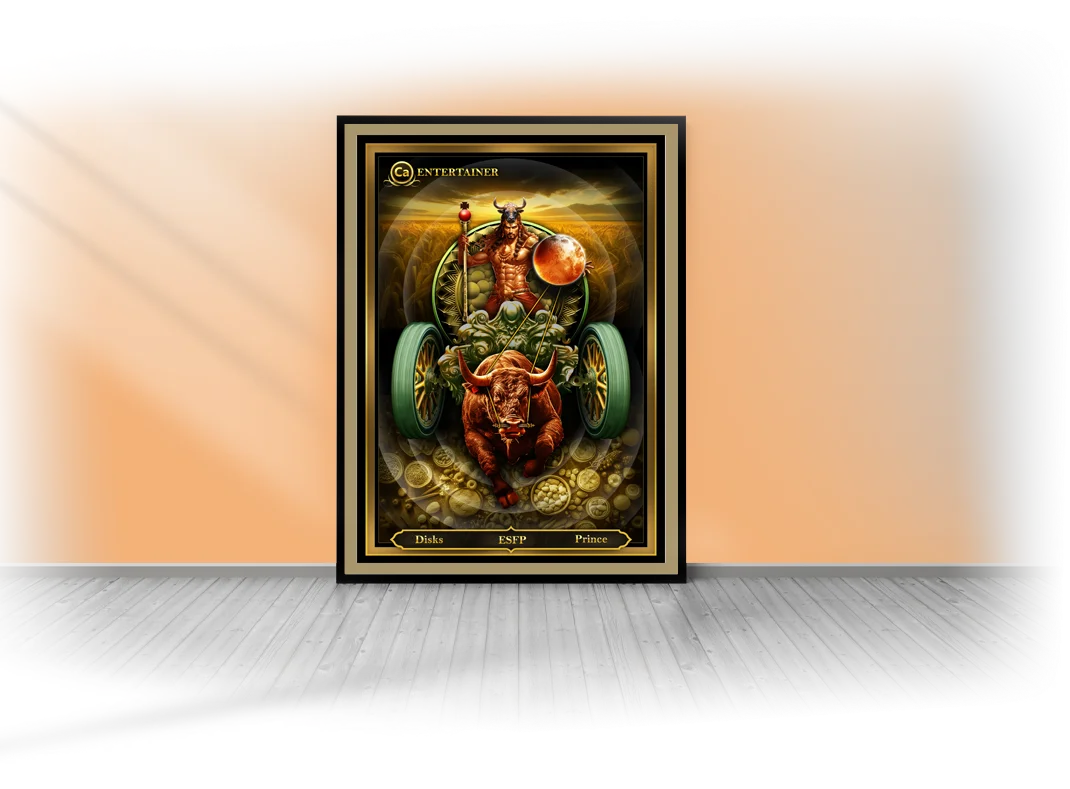
Prince of Pentacles (ESFP: Entertainer)
E=Extraverted, S=Sensation, F=Feeling, P=Prospecting
Airy part of Earth. This type is the energetic and vibrant person who takes pleasure in discovering new and unknown things. They are very social and make friends easily, they push people to open up and have fun. An ESFP is very talkative and has a great sense of humor, they love to laugh and be the center of attention. They find their greatest joy is when they are having fun with their friends and family. They also have a keen eye for fashion and details, a person can see it in all parts of an ESFP’s life. They love the beautiful and simple things in life. This type is very observant and sensitive to other people’s emotions, they want to help them feel wanted and included in any setting. They love bringing other people joy, they love to bring others on their adventures and make memories with them. This type recognizes value and quality, which is a fine trait. However, this type does not do well with confrontation, they are conflict-averse where they ignore conflict altogether. They also do not do well with long-term planning, for example long-term financial planning is a struggle for them, this also makes them unfocused.
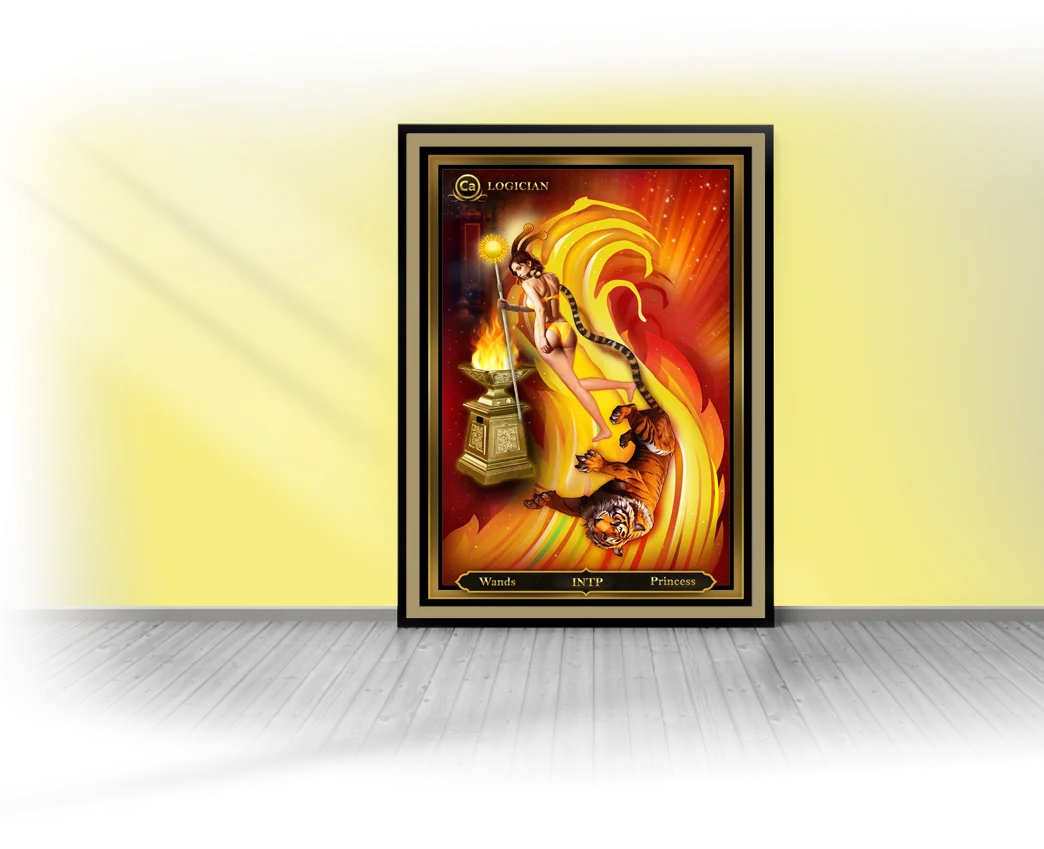
Princess of Wands (INTP: Logician)
I=Introverted, N=INtuition, T=Thinking, P=Prospecting
Earthy part of Fire. This type of person is shy but a flexible thinker, they seek out the path less traveled and enjoy experimenting with personal creativity. They are extremely individual and brilliant. They are reserved and become drained from socializing, but when they find someone who connects with them on an intellectual level and matches their mental energy they bloom and light up to the point where they confide in that person for everything. This type has a reputation for being pensive, detached, and unapproachable. An INTP thoroughly enjoys swapping ideas and having deep conversations with others that match their energy, they have a curious and inquiring soul that allows them to think deeply. This personality type is completely mystified by human nature and the idea that humans make decisions and act upon emotions and feelings. They are ambitious and full of enthusiasm. They feel most comfortable in the space of rationality and reason. These individuals are not necessarily unfeeling, but they do not know how to express their feelings to their friends and loved ones. An INTP struggles with overthinking a lot of things because oftentimes they are stuck in their own minds as they are thinking all of the time. But if they do find themselves stuck, they have everything they need in order to pull themselves out of the situation.
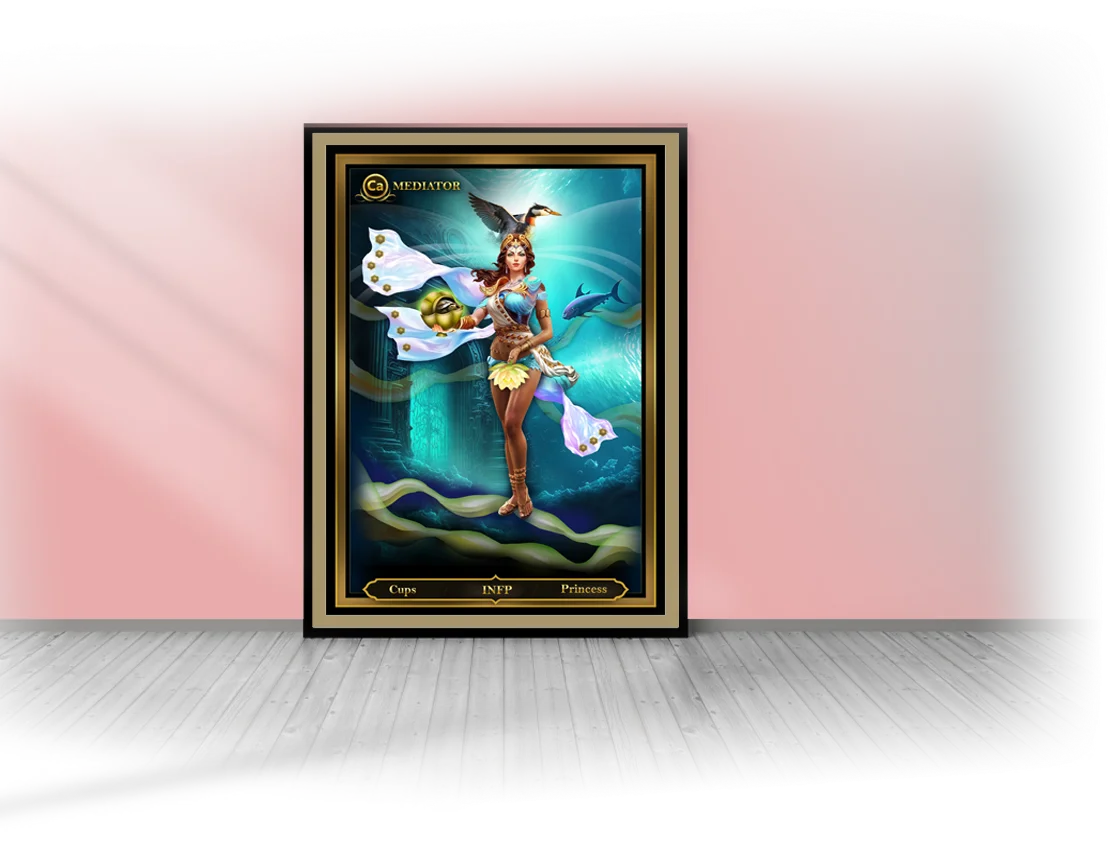
Princess of Cups (INFP: Mediator)
I=Introverted, N=INtuition, F=Feeling, P=Prospecting
Earthy part of Water. This is a rare personality type, the people are quiet, open-minded, and creative. They are kind and caring, and put a touch of happiness and creativity into everything they do. An INFP is often lost in daydreams and their imagination, inventing a wide array of stories and images in their minds. This type is known for their sensitivity and emotional response to arts like music, nature, and art. These people yearn to understand the people around them, while they are also very introspective and highly attuned to their own thoughts and feelings. They long for deep, soulful relationships, and they feel called to help others. This type are compassionate and nonjudgmental, they listen and are attentive to other people’s stories. They can’t help but muse about the meaning and purpose of life, dreaming up all sorts of stories, ideas, and possibilities along the way. They do have to reel themselves in before they become frustrated, they have to make their dreams into reality or else they become frustrated and feel that they are incapable of accomplishing their dreams. Empathy is one of the greatest gifts an INFP possesses, but at times it can be a liability because they feel there are too many things to be set right. This quiet belief in doing the right thing may explain why these personalities so often inspire compassion, kindness, and beauty wherever they go. They tend to be unrealistic and self-isolating as well as self-critical.
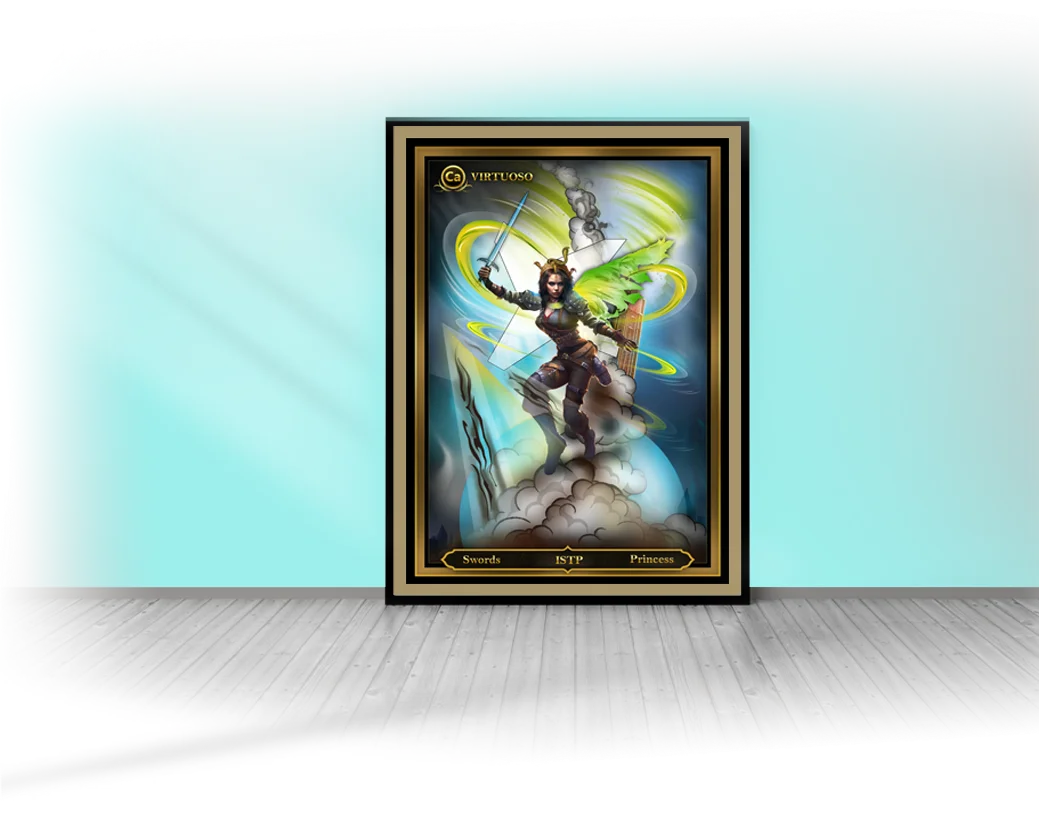
Princess of Swords (ISTP: Virtuoso)
I=Introverted, S=Sensation, T=Thinking, P=Prospecting
Earthy part of Air. This type has an individualistic mindset who loves to explore everything, they do not need much of a connection with an external source they love to pursue goals and things alone. They love observing and exploring the world around them and how it all works, they view it all rationally and with curiosity. They love to do things with their hands, they enjoy creating and going through the trial and error phase, trying things first-hand and experiencing it all for themselves. This type is quite friendly but they enjoy having their own private life, they are spontaneous yet calm. An ISTP has a habit of acting before thinking about it, they act too soon which leads to problems when they expect those around them to do the same thing. Their decisions come from a sense of practical realism, they have the idea of direct fairness at their heart. They pursue and explore relationships through their actions rather than empathy which leads to numerous problems because they do not know how to set boundaries, they just go with the flow. They tend to have risky behavior, they enjoy taking risks.
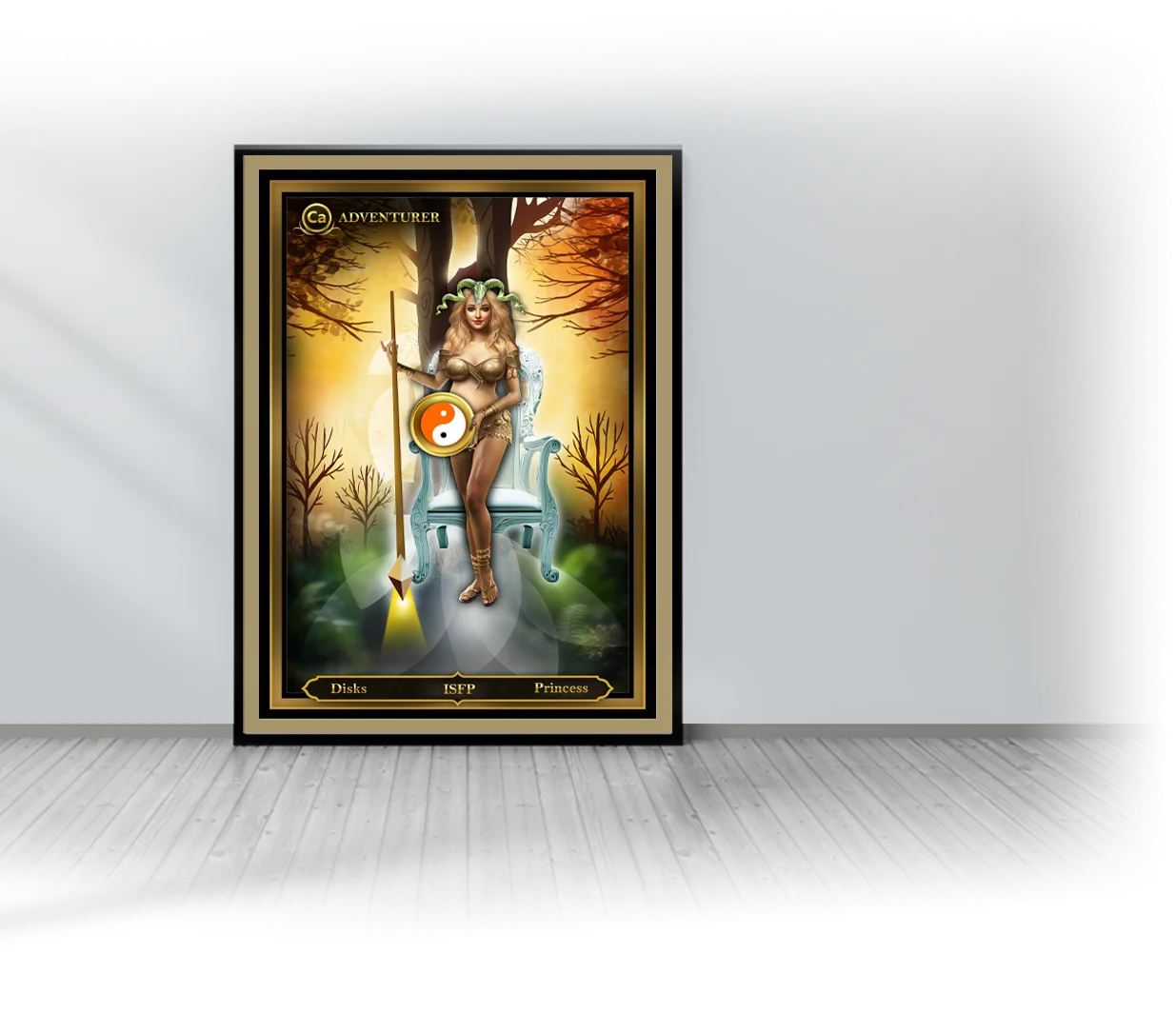
Princess of Pentacles (ISFP: Adventurer):
I=Introverted, S=Sensation, F=Feeling, P=Prospecting
Earthy part of Earth. This type tends to have an open mind and they approach life and new experiences with warmth, they love to stay and live in the moment. This is a deeply emotional type and they treasure beauty, life is a canvas of self-expression where they can paint whatever they want and be whoever they want without worrying about what others think. This is a purely unique personality type. They enjoy art, music, and poetry, they think deeply about life and tend to find the best things every day. Being deeply emotional, this type is also very much introverted meaning they have to recharge after a social gathering, they need time to themselves. An ISFP is driven by curiosity and has an exploratory spirit. They love to try new things and explore an array of passions and interests, they have a flexible and adaptable approach to life and they make sure to leave room in their life for the unexpected. With their specific approach to the way they live their lives, some of their favorite moments and memories are from spontaneous adventures they go on with their friends and family. Their mindset helps them have an open-mind and are tolerant to a majority of the things life throws at them. This personality type loves diversity and living in a world where there are all sorts of people, it keeps things interesting for them. An ISFP is very perceptive and is able to pick up on and identify people’s unspoken emotions, it can make this type upset if they feel that they are not liked or approved of; they also do not do well with criticism and they often lose their temper when they are being unfairly criticized. This type also struggles with long-term plans of any sort, with that being said they also do not stick to their plans. They have an air and spirit of freedom that surrounds them, they love to be flexible and enjoy having their minds changed. An ISFP tends to have a cloudy view of their uniqueness and ability to achieve their goals and worry about letting others down.
